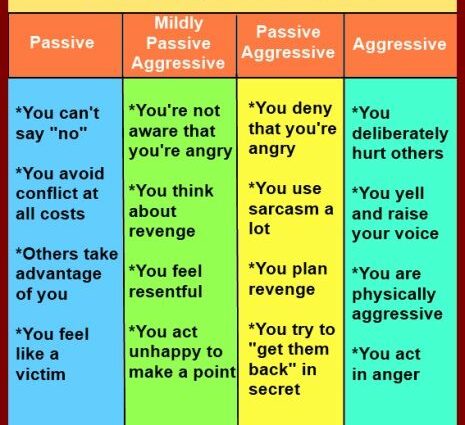Contents
Passive-aggressive
In the family of toxic personalities, I ask for the passive-aggressive! Difficult to define because full of contradictions, passive aggressive people are toxic to others. How do passive-aggressive people behave? What is passive aggression hiding? What to do with passive-aggressive behavior? Answers.
The behavior of passive aggressive
The term “passive-aggressive” was coined during World War II by the American psychiatrist, Colonel Menninger. He had noticed that some soldiers refused to obey orders but did not show it in words or in anger. Instead, they displayed passive behaviors to get their message across: procrastination, demotivation, ineffectiveness… These soldiers had not shown their willingness to say “no” explicitly. This is called masked rebellion.
First listed as a personality disorder in the DSM (Diagnostic and Statistical Manual of Mental Disorders), passive-aggressive disorders were removed from the Manual in 1994. But the fact remains that these personalities may be the origin of major relationship problems at work, in love, in family or in friendship, like any other personality disorder. Indeed, faced with a passive-aggressive who says “yes” but who in reality thinks “no”, we do not know how to react. Always refusing to submit to authority but without saying it clearly, aggressive passive people provoke anger and incomprehension in their interlocutors. In addition to this concealed refusal to obey:
- Denial. Passive-aggressive people do not realize their behavior.
- Lies.
- Resistance to change.
- Victimization.
- The feeling of persecution.
- Criticism of others.
- Social passivity.
Why adopt a passive-aggressive behavior?
We are not born passive-aggressive, we become it. We must distinguish between passive-aggressive behaviors, which we can all resort to in certain situations, from passive aggressive personalities, which are permanent because they repress deeper psychological problems. Thus, several factors can lead to passive aggression:
- Fear of conflict.
- The fear of change. This imposes new rules to which the passive-aggressive will have to submit.
- Lack of self-esteem and self-confidence which manifests itself in increased susceptibility. From where the will not to go to the confrontation to avoid any criticism.
- Growing up in a family that lacked authority and therefore limits or on the contrary in a family where the expression of anger and frustration was not allowed, because of an extremely authoritarian figure.
- Paranoia. The feeling of always being attacked by others may explain this systematic passive-aggressive defense mechanism.
What to do with a passive-aggressive person?
The best way to interact with a passive aggressive is to go with a grain of salt… The more authoritative and insistent you are with him, the less he complies.
At work, try as much as possible not to upset or offend a passive-aggressive colleague because they, unlike you, will have a hard time putting up with them and in response will be unwilling to work with you. For Christophe André, psychiatrist and author of the book “I resist toxic personalities (and other pests)”, It is preferable, with the passive-aggressive, to“always respect the forms, ask him for each decision or each advice”. The fact of feeling useful will give him back his self-confidence. Also, rather than letting him ruminate and complain in his corner, better “encourage him to point out what is wrong”. Passive-aggressive people need reassurance and training to express their needs, anger and frustration. However, do not let yourself be faced with his refusal to obey. Expect a minimum of respect from this person and make them understand that their passive-aggressive behavior is problematic in their relationships with others. Often, passive-aggressive people do not realize that they are, until one day they realize that their professional, romantic, friendly or family relationships are chaotic and that they may well have had something to do with it. since the same destructive patterns are repeated in their lives. In this case, the help of a specialist can be considered and useful to get rid of these overly intrusive behaviors.










